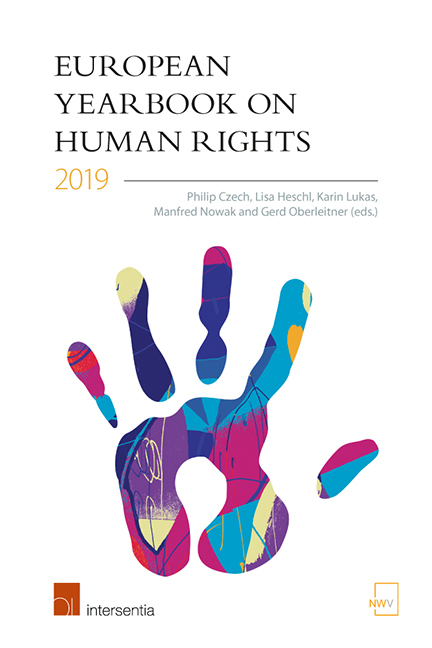Book contents
- Frontmatter
- Miscellaneous Frontmatter
- Editors’ Preface
- Contents
- List of Abbreviations
- List of Contributors
- PART I TOPIC OF THE YEAR
- PART II EU
- PART III CoE
- PART IV OSCE
- PART V REPORTS FROM THE FIELD
- PART VI OTHERS
- PART VII BOOK REVIEWS
- Lisa Heschl: Protecting the Rights of Refugees Beyond European Borders – Establishing Extraterritorial Legal Responsibilities
- Lorenza Violini and Antonia Baraggia (eds.): The Fragmented Landscape of Fundamental Rights Protection in Europe
- Panos Kapotas and Vassilis P. Tzevelekos (eds.): Building Consensus on European Consensus – Judicial Interpretation of Human Rights in Europe and Beyond
- Pieter van Dijk, Fried van Hoof, Arjen van Rijn and Leo Zwaak (eds.): Theory and Practice of the European Convention on Human Rights
- Adrienne Yong: The Rise and Decline of Fundamental Rights in EU Citizenship
- Jeroen Temperman, T. Jeremy Gunn and Malcolm Evans (eds.): The European Court of Human Rights and the Freedom of Religion or Belief – The 25 years since Kokkinakis
- Janneke Gerards: General Principles of the European Convention on Human Rights
- Index
Jeroen Temperman, T. Jeremy Gunn and Malcolm Evans (eds.): The European Court of Human Rights and the Freedom of Religion or Belief – The 25 years since Kokkinakis
from PART VII - BOOK REVIEWS
Published online by Cambridge University Press: 24 January 2020
- Frontmatter
- Miscellaneous Frontmatter
- Editors’ Preface
- Contents
- List of Abbreviations
- List of Contributors
- PART I TOPIC OF THE YEAR
- PART II EU
- PART III CoE
- PART IV OSCE
- PART V REPORTS FROM THE FIELD
- PART VI OTHERS
- PART VII BOOK REVIEWS
- Lisa Heschl: Protecting the Rights of Refugees Beyond European Borders – Establishing Extraterritorial Legal Responsibilities
- Lorenza Violini and Antonia Baraggia (eds.): The Fragmented Landscape of Fundamental Rights Protection in Europe
- Panos Kapotas and Vassilis P. Tzevelekos (eds.): Building Consensus on European Consensus – Judicial Interpretation of Human Rights in Europe and Beyond
- Pieter van Dijk, Fried van Hoof, Arjen van Rijn and Leo Zwaak (eds.): Theory and Practice of the European Convention on Human Rights
- Adrienne Yong: The Rise and Decline of Fundamental Rights in EU Citizenship
- Jeroen Temperman, T. Jeremy Gunn and Malcolm Evans (eds.): The European Court of Human Rights and the Freedom of Religion or Belief – The 25 years since Kokkinakis
- Janneke Gerards: General Principles of the European Convention on Human Rights
- Index
Summary
During these times, Article 9 of the European Convention on Human Rights (ECHR, the Convention) arguably is the most contentious provision the judges of the European Court of Human Rights (ECtHR, the Court) have to deal with. The collection of Temperman, Gunn and Evans joins the ranks of books on Article 9 and identifies the following reasons for the recently increased number of applications concerning the freedom of religion or belief: on the one hand, migration is the main driver for a growing religious diversity, and on the other hand, both, the increasing popularity of innovative ‘religious movements and “spiritualties”’ as well as the rising importance of secularism and the ‘undeniable process of “unchurching”’ cause more and more applications (pp. 369ff.).
Yet it seems that the ECtHR can hardly satisfy the very different expectations of believers as opposed to secularists or of members of majority religions as opposed to followers of minority religions (p. 370). Each decision concerning Article 9 is therefore thoroughly reviewed, widely discussed and broadly criticised, rendering the said topic highly emotional and polarising.
Nonetheless, the book determines that such a development in the context of freedom of religion or belief was anything but predictable and anticipated, especially in light of the lack of any decision on Article 9 between the Court's establishment in 1959 and 1993, when the ECtHR issued its first ruling squarely invoking the said article in the Kokkinakis v Greece case.
It is this case – which is often considered as the ‘turning point’ in the history of Article 9 – that serves as the ‘focus point’ of this collection, thus giving the compendium a clear structure (p. 13). The book is divided into four parts with a total of 19 separate chapters of renowned contributors. Part one depicts the Pre- and Post-Kokkinakis era in two chapters, respectively addressing the main challenges of the said periods. This part reveals, for instance, that before Kokkinakis, cases concerning ‘corporal punishment’ in public schools (imposed against the beliefs of the parents of the punished child), at that time mostly dealt with under Article 2 of Protocol No. 1, were prevalent, while nowadays it is ‘curriculum’ cases – with the parents either being religious or secular and oppose either compulsory sex education or religious education classes – that are brought before the Court (p. 14).
- Type
- Chapter
- Information
- European Yearbook on Human Rights 2019 , pp. 579 - 582Publisher: IntersentiaPrint publication year: 2019



